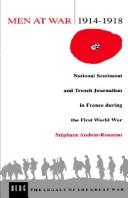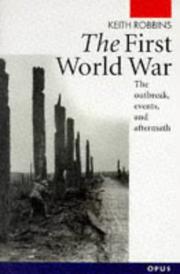| Listing 1 - 10 of 717 | << page >> |
Sort by
|
Book
Year: 1924 Publisher: Brussel : Ministerie van Landsverdediging,
Abstract | Keywords | Export | Availability | Bookmark
 Loading...
Loading...Choose an application
- Reference Manager
- EndNote
- RefWorks (Direct export to RefWorks)
Book
ISBN: 070640484X Year: 1975 Publisher: London : Octopus Books,
Abstract | Keywords | Export | Availability | Bookmark
 Loading...
Loading...Choose an application
- Reference Manager
- EndNote
- RefWorks (Direct export to RefWorks)
Book
ISBN: 0333305167 Year: 1980 Publisher: London : Papermac,
Abstract | Keywords | Export | Availability | Bookmark
 Loading...
Loading...Choose an application
- Reference Manager
- EndNote
- RefWorks (Direct export to RefWorks)
World War, 1914-1918. --- Première guerre mondiale --- World War 1, 1914

ISBN: 0854966730 0854963332 Year: 1992 Publisher: Providence ; Oxford : Berg,
Abstract | Keywords | Export | Availability | Bookmark
 Loading...
Loading...Choose an application
- Reference Manager
- EndNote
- RefWorks (Direct export to RefWorks)
France. --- Soldiers --- World War 1. --- World War, 1914-1918 --- Psychology --- Journalism, Military --- Psychological aspects.
Book
ISBN: 033362078X 9780333620786 Year: 1994 Publisher: London : Papermac,
Abstract | Keywords | Export | Availability | Bookmark
 Loading...
Loading...Choose an application
- Reference Manager
- EndNote
- RefWorks (Direct export to RefWorks)
Military campaigns. --- Weltkrieg (1914-1918). --- Western Europe. --- Westfront. --- World War 1 --- World War, 1914-1918 --- History. --- Armistices. --- Campaigns --- 1914-1918. --- Geschichte 1914.
Book
ISBN: 1487519699 1487519680 9781487519698 9781487519681 9781487523213 1487523211 Year: 2018 Publisher: Toronto
Abstract | Keywords | Export | Availability | Bookmark
 Loading...
Loading...Choose an application
- Reference Manager
- EndNote
- RefWorks (Direct export to RefWorks)
"The First World War is often credited as being the event that gave Canada its own identity, distinct from that of Britain, France, and the United States. Less often noted, however, is that it was also the cause of a great deal of friction within Canadian society. The fifteen essays contained in Canada and the First World War examine how Canadians experienced the war and how their experiences were shaped by region, politics, gender, class, and nationalism. Editor David MacKenzie has brought together some of the leading voices in Canadian history to take an in-depth look into the tensions and fractures the war caused, and to address the way some attitudes about the country were changed, while others remained the same. The essays vary in scope, but are strongly unified so as to create a collection that treats its subject in a complete and comprehensive manner. Canada and the First World War is a tribute to esteemed University of Toronto historian Robert Craig Brown, one of Canada's greatest authorities on the Great War World War One. The collection is a significant contribution to the on-going re-examination of Canada's experiences in war, and a must-read for students of Canadian history."--
World War, 1914-1918 --- Canada. --- Armistice Day. --- Canadian. --- Festschrift. --- First World War. --- The Great War. --- WW1. --- WWI. --- armistice. --- army. --- history. --- national transformation. --- world war 1.
Book
ISBN: 1501754718 Year: 2021 Publisher: Ithaca, New York ; London : Cornell University Press,
Abstract | Keywords | Export | Availability | Bookmark
 Loading...
Loading...Choose an application
- Reference Manager
- EndNote
- RefWorks (Direct export to RefWorks)
Timothy W. Crawford's 'The Power to Divide' examines the use of wedge strategies, a form of divisive statecraft designed to isolate adversaries from allies and potential supporters to gain key advantages.
Book
ISBN: 3110435993 3110346222 3110443481 9783110435993 Year: 2015 Publisher: De Gruyter
Abstract | Keywords | Export | Availability | Bookmark
 Loading...
Loading...Choose an application
- Reference Manager
- EndNote
- RefWorks (Direct export to RefWorks)
Nearly fourteen million people died during the First World War. But why, and for what reason? Already many contemporaries saw the Great War as a "pointless carnage" (Pope Benedict XV, 1917). Was there a point, at least in the eyes of the political and military decision makers? How did they justify the losses, and why did they not try to end the war earlier? In this volume twelve international specialists analyses and compares the hopes and expectations of the political and military leaders of the main belligerent countries and of their respective societies. It shows that the war aims adopted during the First World War were not, for the most part, the cause of the conflict, but a reaction to it, an attempt to give the tragedy a purpose - even if the consequence was to oblige the belligerents to go on fighting until victory. The volume tries to explain why - and for what - the contemporaries thought that they had to fight the Great War.
World War, 1914-1918 --- Causes. --- Political aspects. --- Social aspects. --- European War, 1914-1918 --- First World War, 1914-1918 --- Great War, 1914-1918 --- World War 1, 1914-1918 --- World War I, 1914-1918 --- World War One, 1914-1918 --- WW I (World War, 1914-1918) --- WWI (World War, 1914-1918) --- History, Modern --- World War (1914-1918) --- 1914 - 1918 --- World War I Period --- World War 1 --- History
Book
ISBN: 1618119591 9781618119599 9781644690901 164469090X 9781618119575 1618119583 9781618119582 1618119575 Year: 2019 Publisher: Boston, MA : Academic Studies Press,
Abstract | Keywords | Export | Availability | Bookmark
 Loading...
Loading...Choose an application
- Reference Manager
- EndNote
- RefWorks (Direct export to RefWorks)
The Great War is still seen as a mostly European war. The Middle Eastern theater is, at best, considered a sideshow written from the western perspective. This book fills an important gap in the literature by giving an insight through annotated translations from five Ottoman memoirs, previously not available in English, of actors who witnessed the last few years of Turkish presence in the Arab lands. It provides the historical background to many of the crises in the Middle East today, such as the Arab-Israeli confrontation, the conflict-ridden emergence of Syria and Lebanon, the struggle over the holy places of Islam in the Hejaz, and the mutual prejudices of Arabs and Turks about each other.
World War, 1914-1918 --- European War, 1914-1918 --- First World War, 1914-1918 --- Great War, 1914-1918 --- World War 1, 1914-1918 --- World War I, 1914-1918 --- World War One, 1914-1918 --- WW I (World War, 1914-1918) --- WWI (World War, 1914-1918) --- History, Modern --- Arabs. --- Arab–Israeli confrontation. --- First World War. --- Great War. --- Hijaz. --- Jemal Pacha. --- Lebanon. --- Middle East. --- Ottoman Empire. --- Palestine. --- Syria. --- The Great War. --- Turkish-Arab relations. --- Turks. --- WWI:World War One. --- World War 1. --- World War I. --- collective memory. --- military history.

ISBN: 0192891499 Year: 1993 Publisher: Oxford Oxford University Press
Abstract | Keywords | Export | Availability | Bookmark
 Loading...
Loading...Choose an application
- Reference Manager
- EndNote
- RefWorks (Direct export to RefWorks)
World history --- anno 1910-1919 --- World War, 1914-1918. --- Lerarenopleiding --- (vak)didactiek menswetenschappen --- World War, 1914-1918 --- European War, 1914-1918 --- First World War, 1914-1918 --- Great War, 1914-1918 --- World War 1, 1914-1918 --- World War I, 1914-1918 --- World War One, 1914-1918 --- WW I (World War, 1914-1918) --- WWI (World War, 1914-1918) --- History, Modern --- (vak)didactiek menswetenschappen.
| Listing 1 - 10 of 717 | << page >> |
Sort by
|

 Search
Search Feedback
Feedback About UniCat
About UniCat  Help
Help News
News